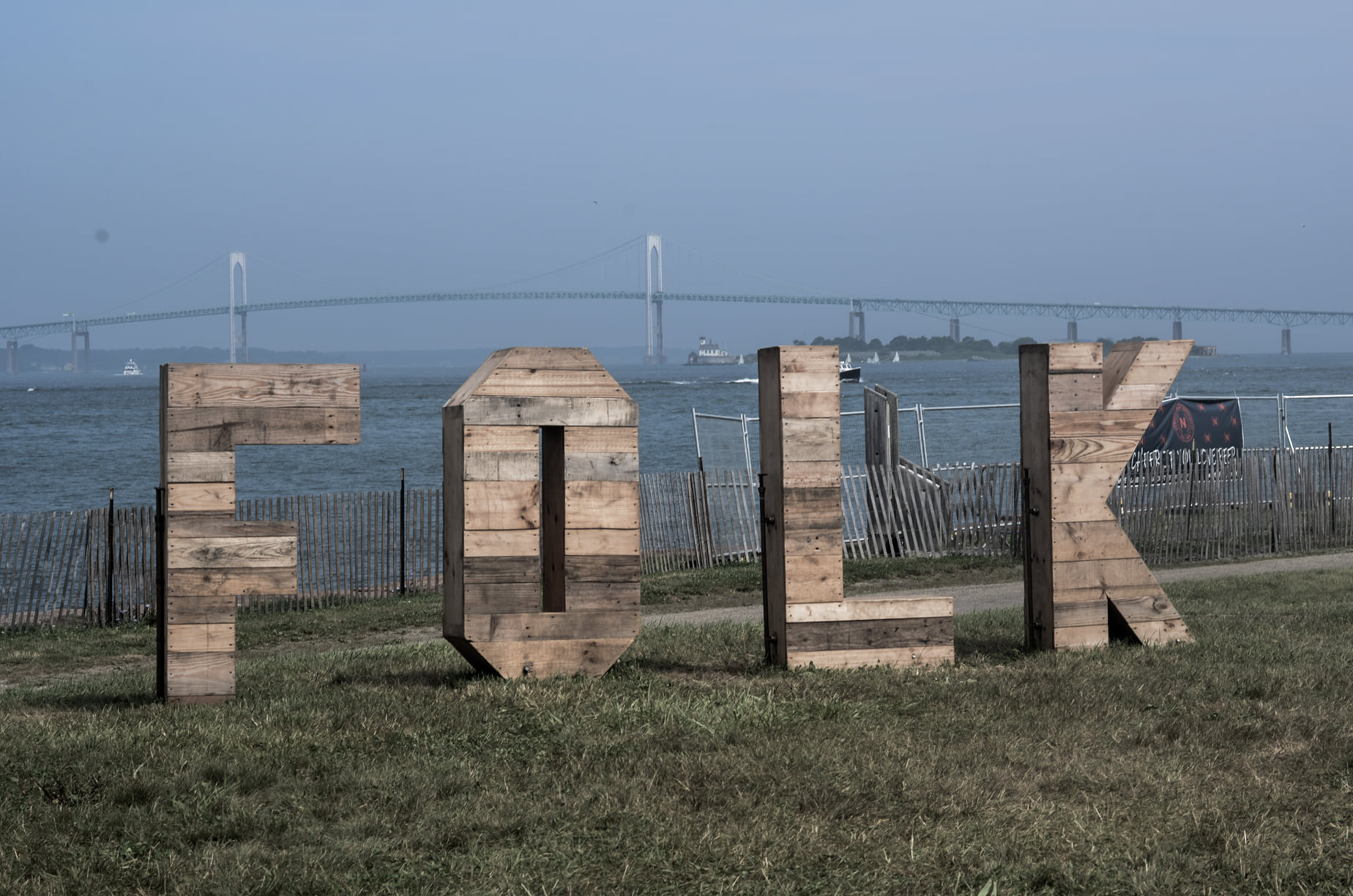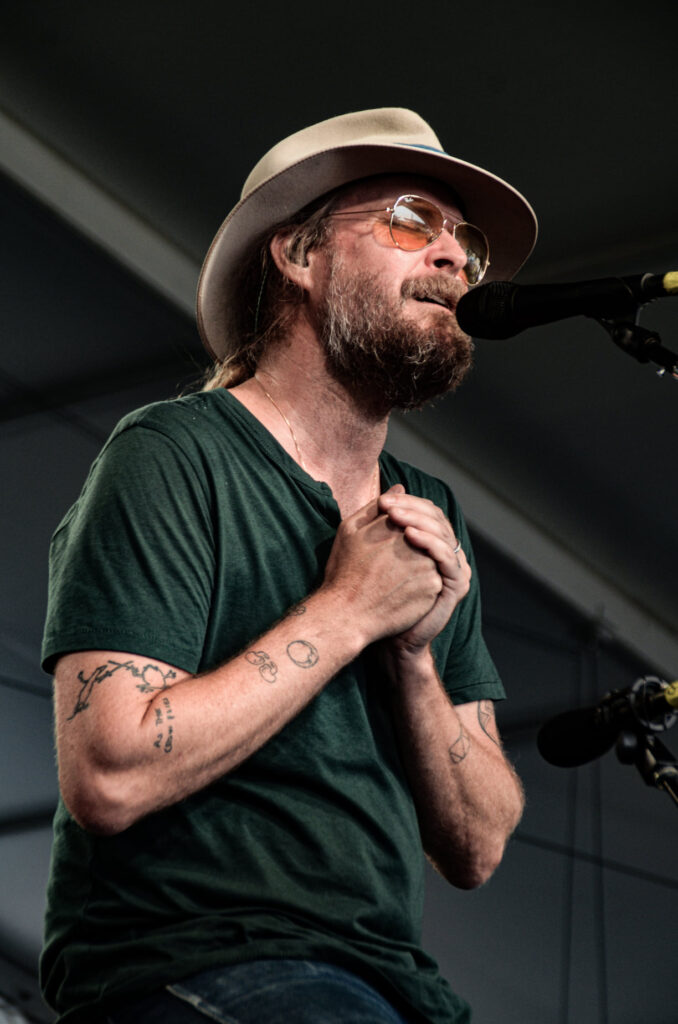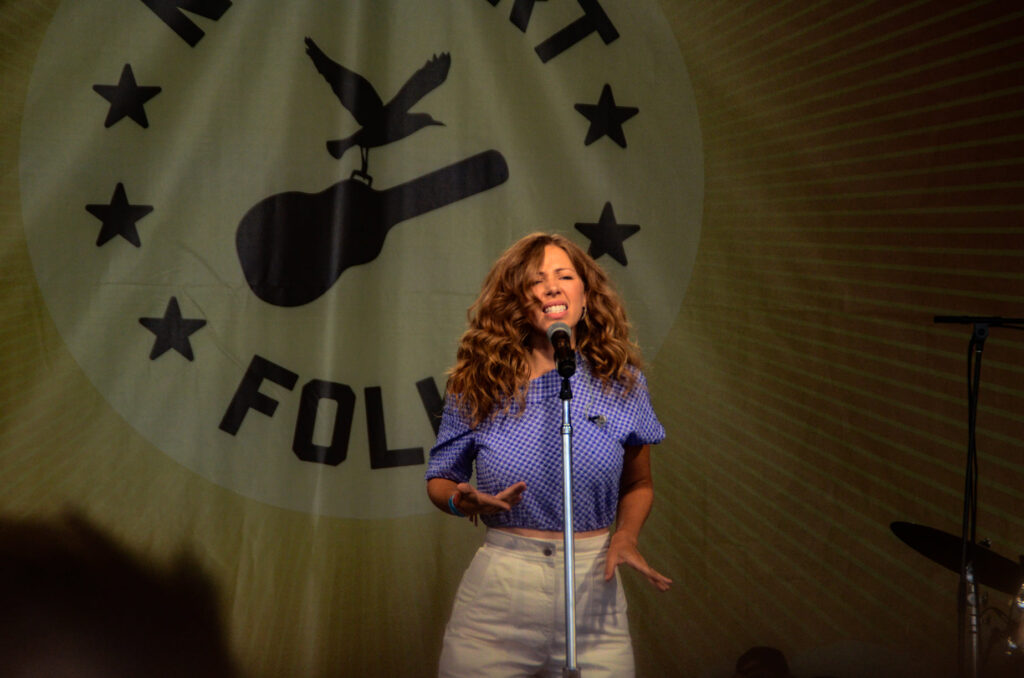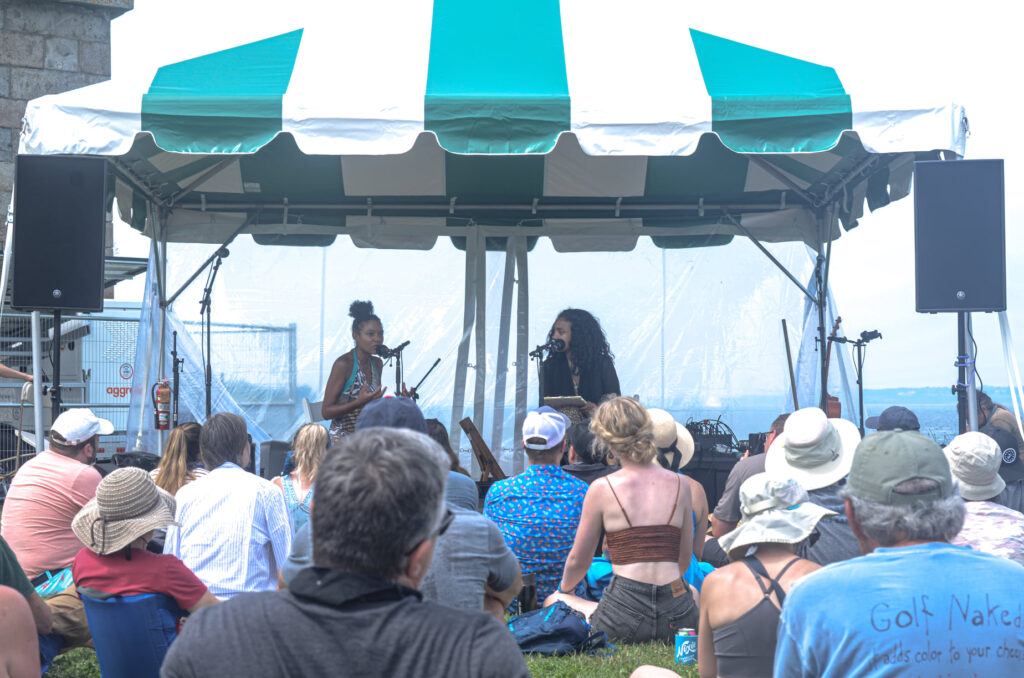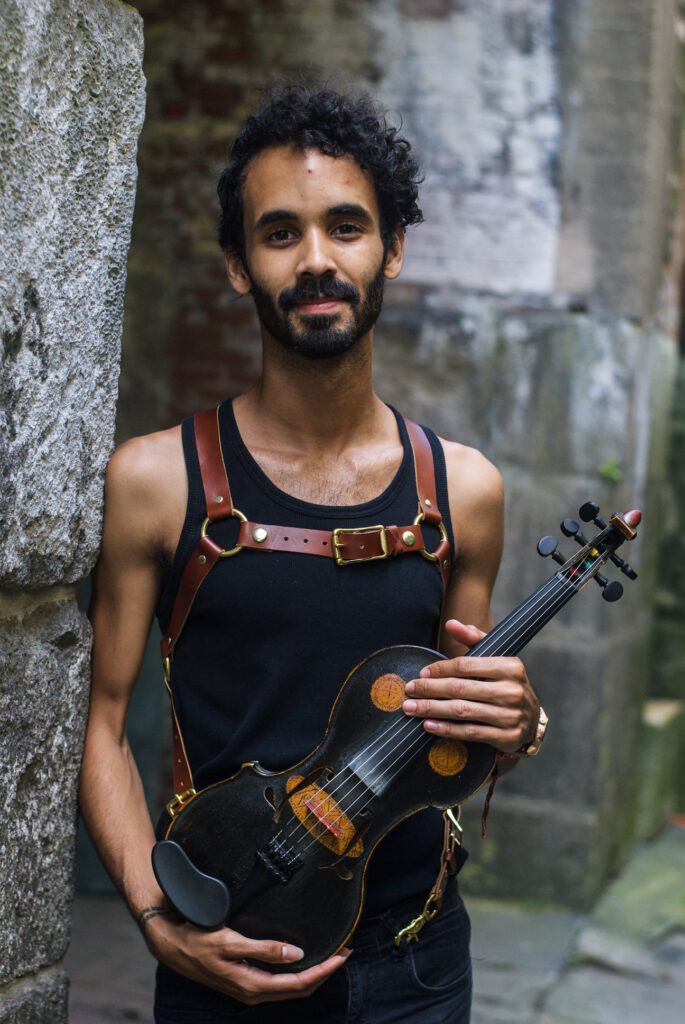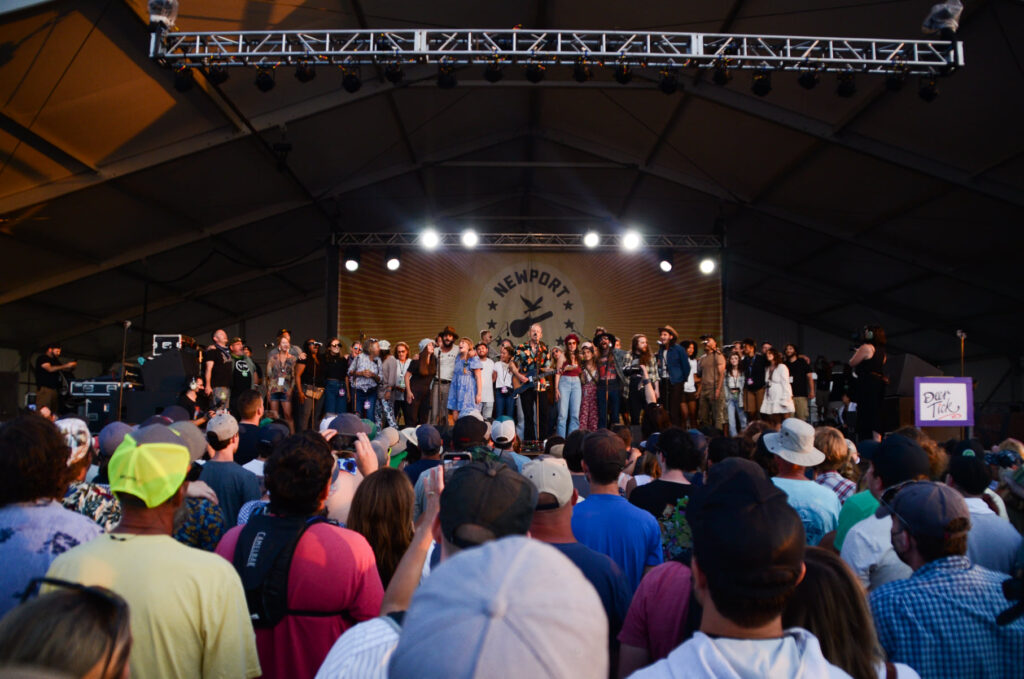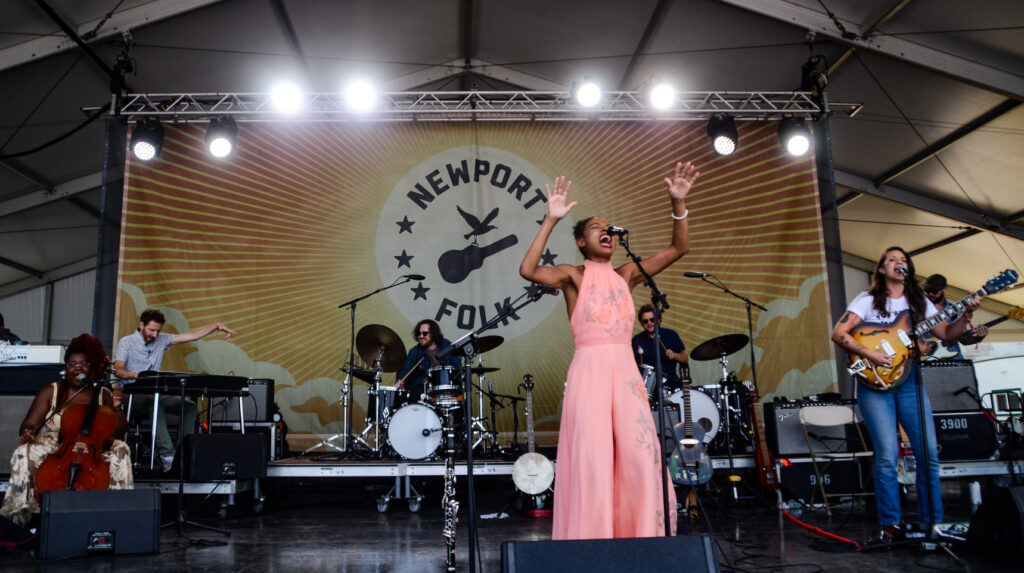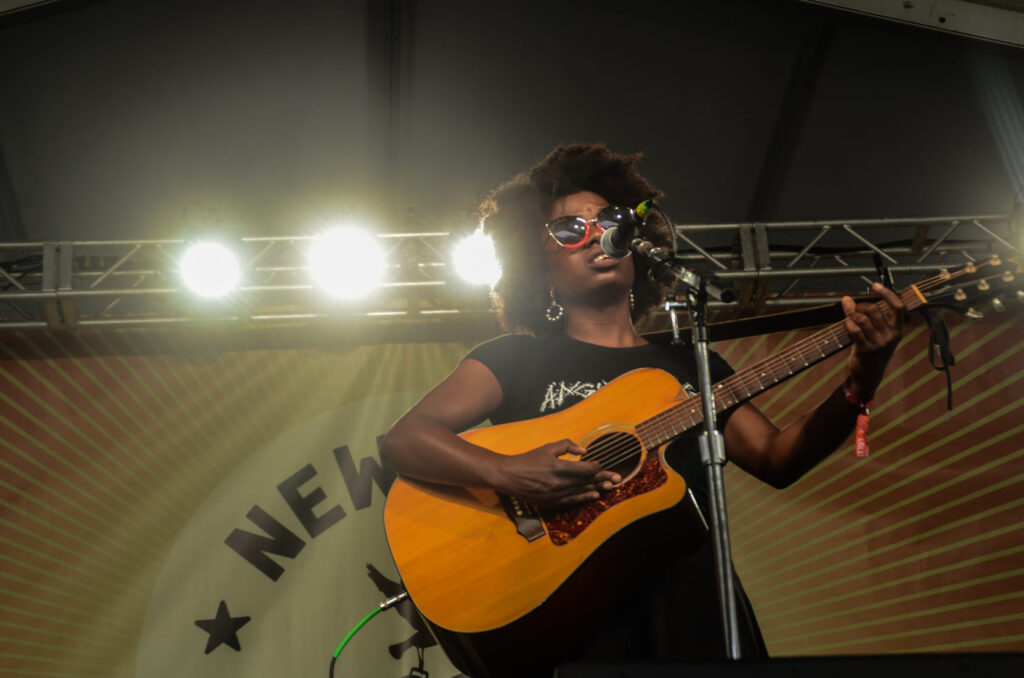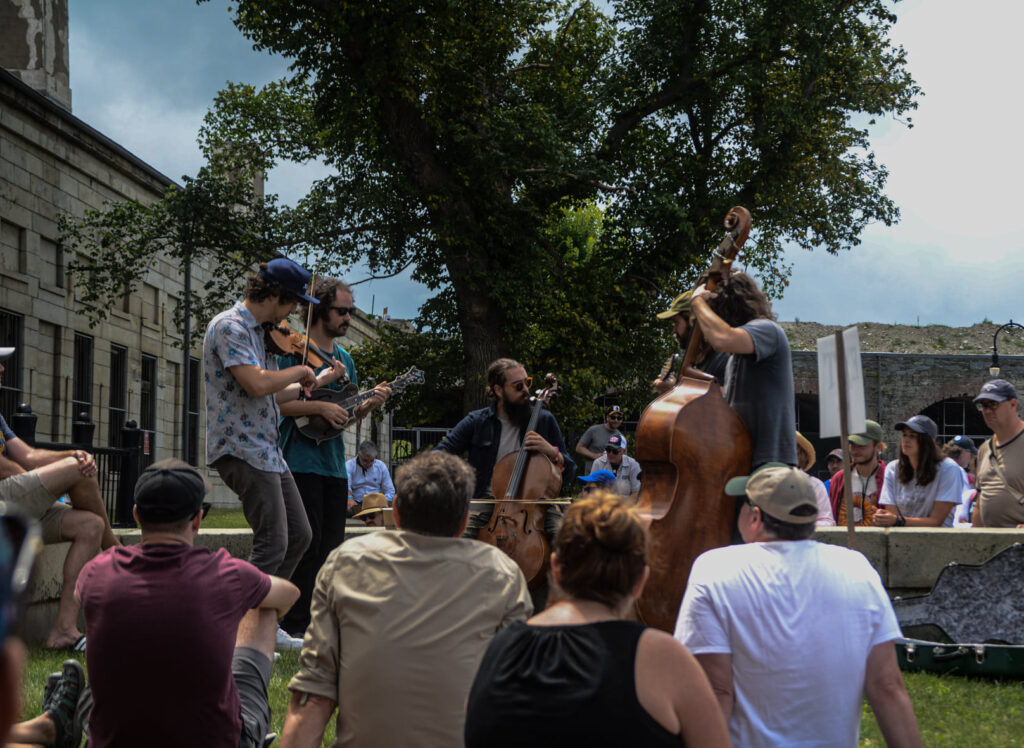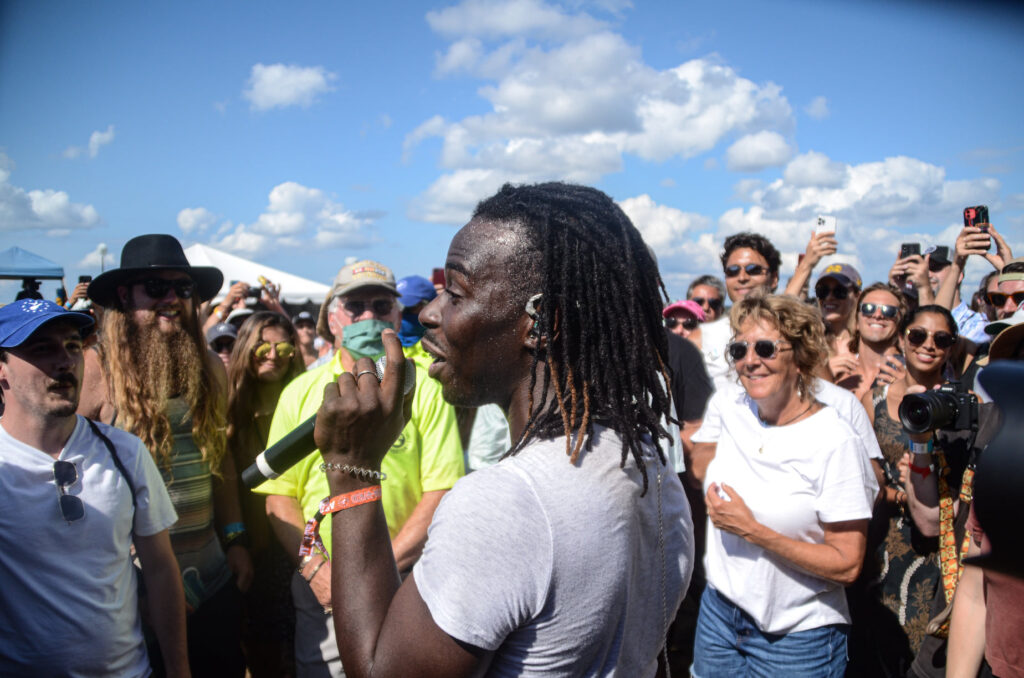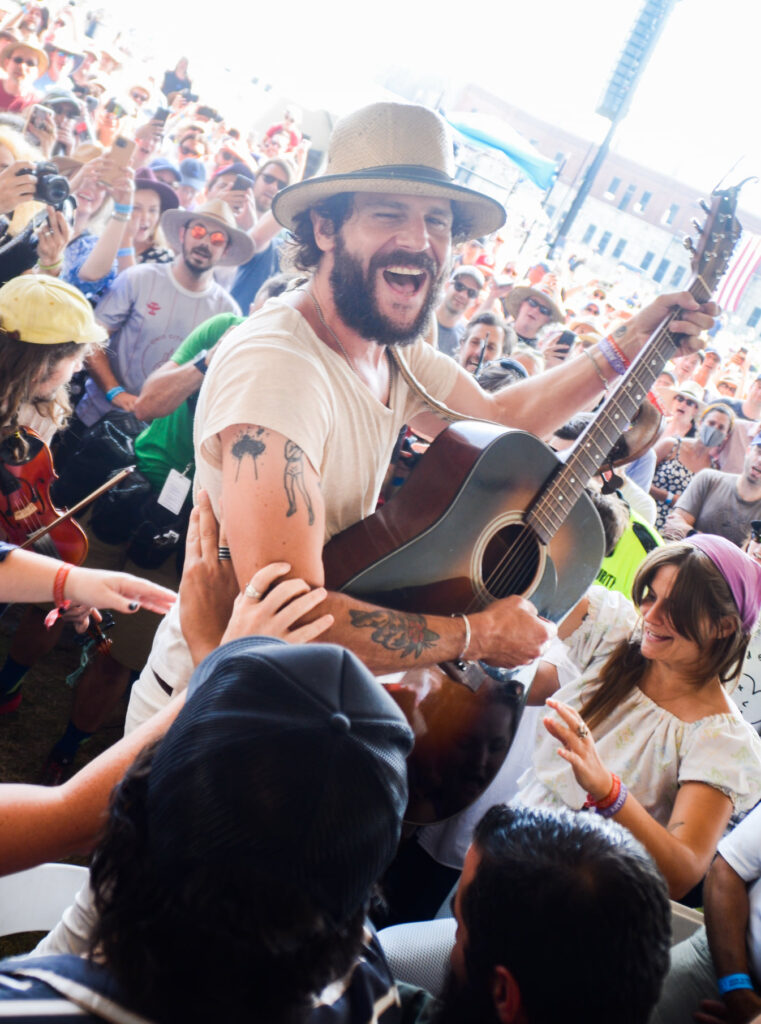Folk On! 2021
Remember in March of 2020 when we thought we might have to adjust our lives significantly for two whole weeks? And then those two weeks became a month, and two months, and on and on. Seeing the announcements of artists for the 2020 Newport Folk Festival, and imagining the joyful noise from the Fort, was a relatively small loss, compared to the lives and livelihoods claimed by this pandemic.
But when plans for a version of the Festival, called “Folk On!” emerged over the winter, I started to feel some hope. The usual three-day event was stretched to six days. In what is now becoming an industry standard, Folk On! Required proof of vaccination or a recent negative COVID test. I was fortunate enough to be there for the last three days, July 26-28.
As I reflect on Folk On, some lessons occur to me. So, here are some ways to think about what I learned in three days at Newport.
1 . Less Is More
I was struck by the number of acts that played stripped-down or solo sets. Brothers of a Feather, Beck, Sunny War, Hiss Golden Messenger, Katie Pruitt, and many more all played in a simpler style and it was wonderful. There was an intimacy that can only be achieved by electing to play solo or in a duo setting. I loved Hiss Golden Messenger opening his set a capella, with a cover of Bernice Johnson Reagon’s song, “There’s A New World Coming.” In set after set, I was reminded that quiet sounds and quiet voices can be loud.
Other acts played as trios: Langhorne Slim and Aoife O’Donovan, and Caamp’s gorgeous, hushed set on the Busking Stage. The Busking Stage in general was a really nice addition. It kind of replaced the Family Tent and Museum Stage and was a place for unannounced sets to capture a moment. The Busking Stage also hosted the open mic and Adia Victoria’s amazing conversations for her podcast Call and Response. I don’t know if that stage will be a feature of future festivals, but there were many highlights there: Andrea Von Kampen, who will be on the bigger stages soon; Christopher Paul Stelling, whose new songs feel so urgent and well-crafted; the Andrew Marlin Band just wowing with thirty minutes of beautiful songs without a break in between.
With only two main stages (the familiar Quad stage and a smaller version of the former Fort Stage that was the “Lawn” stage this year), it also felt like there wasn’t as much FOMO as in years past. There were definite conflicts: Fruit Bats and Hiss Golden Messenger at the same time was a killer. “Thanks for choosing me,” Mike Taylor said to the crowd. “I think I would have chosen Fruit Bats, to be honest.” But you could get back and forth if you wanted to, and you weren’t kicking yourself for also missing someone on the Harbor Stage or the Museum, and you didn’t get caught in a traffic jam at the tunnel because most people made their choices and weren’t running back and forth.
Of course, there were fewer people in attendance—the audience was effectively half of what it is normally. In the early sets, it felt a bit sparse, but I don’t think the size of the crowd detracted at all from the artists’ experience, because the people who were there were so invested in really listening to the music. Emma Swift and Robyn Hitchcock played a lovely set of Dylan songs to a transfixed crowd on Wednesday morning, drawn from Swift’s recent album Blonde on the Tracks. Steve Gunn played one of the best sets of the three days. Steve’s performance of “New Familiar” was a highlight and his version of “Wild Mountain Thyme,” was both unique and respectful of the song’s tradition. (This was supposed to have been a set with William Tyler, but William tested positive for COVID a few days before he was due to come to Newport, which was a huge disappointment.)
By the time the evening sets rolled around, the space was full, but it wasn’t packed. If you wanted to be farther away from other people, you could do so without leaving the music behind. In some ways, it felt a little subdued, but it also felt safe, and that counts for a lot these days.
2 . Quad Goals
Festival-goers often develop an affinity for certain stages. This year, it was all about the Quad, especially the headliners. So, the lesson, maybe, is that the “biggest” name and set is not always the best. For me, as an audience member, the finales on the Quad Stage were the closing sets, and were some of the best I’ve ever seen: Bonny Light Horseman (Monday), Billy Strings (Tuesday), and Lake Street Dive (Wednesday).
Bonny Light Horseman played Newport in 2019 and I didn’t really know what to expect. I just followed rule number one: if Josh Kaufman is involved, go. The music is so ethereal and the pleasure that Josh, Eric, and Anais exude playing together is infectious. Eric’s banter was also dry and hilarious, with a running joke about the inspiration for Bonny Light Horseman: the classic film Ghostbusters. Their new songs are wonderful, and they shared the exciting news that a second album is on its way; a good thing, because I’ve worn out the grooves on the first one.
This was the first time I have seen Billy Strings and his amazing band. Is it appropriate to say that he does things on guitar that maybe no one else can do? And I don’t just mean the speed, which is gobsmacking. I also mean his timing and his creativity with pedals to evoke a whole range of sounds from an acoustic guitar that you just don’t expect. Billy Strings is a force and, eventually, the crowd standing in the back rushed forward in the aisles and everyone was on their feet. I’ve never seen an encore at Newport, but as he left the stage, the crowd chanted “Billy! Billy! Billy!” and he got the nod from the stage manager to do one more.
Lake Street Dive was the final headliner on the Quad stage and ohmygoodness they brought everything to this set. They opened with “Bad Self Portraits,” and never looked back. I really liked their new songs, especially, “Making Do.” There was curiosity about how the band would be, given that founding member Mike “McDuck” Olson recently left the group. Um, they’re fine. New guitarist James Cornelison fit right in and I loved the way they shifted from a full-band set up to gathering around one mic and back again. By the end of their set, the crowd had once again packed the aisles, and everyone was grooving.
3. Know Better, Do Better
The very first thing I experienced on Monday was the recording of Adia Victoria’s podcast Call and Response between Adia and Allison Russell. I cannot recommend this conversation enough. It is open, vulnerable, and clear about what needs to be different for a truly inclusive folk community. The night before, Allison had curated a set that prominently featured Black women, including Adia, Amythyst Kiah, Celisse, Yola, Sunny War, Yasmin Williams, Kam Franklin, and many more, including, incredibly, Chaka Khan.
One of the first things that Allison said in the conversation was that all of the Black women on that bill were mistaken for each other at times while at Newport. It is common for festivals to feature one Black woman but very rarely several, and part of the inspiration for Allison’s set was to display the abundance and diversity of talent that Black women bring. Adia shared that she didn’t join the historic set curated by Brandi Carlile in 2019 that culminated in Dolly Parton sharing the stage with two-dozen women because she didn’t feel like it was a space for her: Yola was the only Black artist on the stage. “I’m tired,” Adia said, “of seeing one of us surrounded by whiteness.”
I will say that I noticed the whiteness on that stage in 2019 but I didn’t say anything or write about it. At the time, I told myself that it wasn’t my place, as a straight white guy, to critique the set that so powerfully celebrated women, led by a queer woman. That was a cop-out. I think that what I really didn’t want was any potential backlash. I protected my own status and chickened out.
Someone could point out that the closing Sunday set in 2019 was curated by Jon Batiste and featured Rhiannon Giddens, Allison Russell, Mavis Staples, Leon Bridges, and other artists of color. True, true. But the vast majority of the women on stage for Allison’s curated set also had their own set during the Festival; that was not true of the artists for that Sunday set in 2019. So, as a fan, you could get to know Celisse’s music, or Joy Olakodun’s.
If you pay attention to the many other festivals running this summer, you will see that it is far more common to see almost entirely white bills, with one or two artists of color. As Jake Blount commented in his stunning debut set, “There are those who say that a Black fiddle player isn’t profitable, and I’m here to prove that wrong.”
I think what Allison and Adia so beautifully discussed was that this is not a zero-sum, either-or consideration, and everybody wins–fans, artists, venues, festivals–when we reject a whitewashed roots music. Because, ultimately, a rootsfolkamericana music festival (or your own rootsfolkamericana playlist) that is mostly white is a lie. As Adia asked in her conversation with Jay Sweet, when we say folk music, who are the folk? When we say roots, whose roots?
Know better, do better. And “do better” does not just mean: call Yola “Yola” and call Kam “Kam.” Yes, do that.
But also: support artists, venues, labels, and organizations that show their commitment to justice with dollars, platforms, time, mentorship, and love. Adia and Allison specifically mentioned Brandi Carlile, Margo Price, and Jason Isbell as white folks using their platforms for racial equity. Brandi has raised over $100,000 for the Rainey Day Fund. Margo has mentored Adia and opened doors for her. Jason’s 8-night run at the Ryman features opening sets by seven Black women. Adia’s podcast also features a conversation with Jay Sweet about the work Newport Festivals Foundation is doing and the work that remains. One organization the Foundation co-sponsors is near and dear to my heart, Country Soul Songbook, a grassroots effort based in Durham, NC, led by Kamara Thomas, Kym Register, and Heather Cook to support BIPOC and queer artists. Yes, you can still listen to white guys. It’s not zero-sum. No one has to lose.
4. Mistakes Will Be Made, So Let’s Talk About It
A white friend of mine said that at the end of a few days of racial equity training, the facilitator closed with these words: “Now, go make a million mistakes.” Anyone who is trying to act for justice will make mistakes. Anyone who tries to create something will make mistakes. And in the music world, those two things converge. The only way to avoid mistakes is to not do anything.
There was a small social media dust-up when Emma Swift was bumped from her Busking Stage set to give Middle Brother a surprise set on the small stage. She was rightfully upset, and shared that news on twitter, and she was right to share it. The responses of people in the twitterverse to this mistake was full of righteous indignation and a good reminder that some mediums reward rage more than anything. As far as I could tell, as soon as Jay Sweet learned of the mistake, he worked to correct it. Emma opened the Festival from the Lawn Stage on Wednesday and she shared that there was an apology and she felt like amends were made. Mistakes will happen: know better, do better.
The finale of the whole six days was Deer Tick, inviting the group of musicians and staff watching from the wings on stage to sing “Goodnight, Irene,” the Leadbelly classic that has marked the end of Newport for years. Deer Tick had just delivered a truly blistering set, going for broke. Their energy, and how special they knew it was to be playing at Newport once again, made it a set that was a truly fantastic ending. Deer Tick is a Rhode Island band, and has, for years, hosted Newport Aftershows and just released a concert that they played to an empty Fort in 2020. In short, they’ve got history and they were a great pick to wrap Folk On. For the last song, they kind of gestured to the wings, and everyone who’d been there watching the set—musicians and staff alike—joined them on stage.
On the one hand, I loved it. The stage was full, the crowd was singing. Staff members who worked their asses off were able to not-work for four and a half minutes and just bask in what they’d collectively accomplished. People who had played Newport for the first time were arm-in-arm with Newport veterans, welcomed to the family.
And yet. It was also a missed opportunity to pass the mic: everyone on stage joined in on the chorus, but John McCauley sang all the verses. John didn’t do anything intentionally wrong, so don’t get all defensive. It wasn’t an intentional exclusion. But, after a few days of explicit, intentional commitment to shifting the way things are done, to end unintentionally felt off. It wasn’t the most racially diverse group of folks on the stage to begin with, but there were plenty of people who weren’t straight white men who could have taken the mic. And here’s the thing: it would have been a better performance. Not zero-sum; everyone wins.
I’m trying to hold those two truths right now as I reflect on the three days: something can be wonderful and joyous and emotional and be a missed opportunity. If this feels like it’s unfair or nitpicky, well…maybe. But I didn’t say anything when I noticed the whiteness of the finale in 2019, and that was wrong. So I’m trying to do better and I hope this is received with loving commitment to the values our community espouses.
5. Family is Forever
When you go to Newport, many people refer to it as a family. And those who really get it know that everyone is in: the artists, the staff, the fans, everybody is in the family. That feeling of connection was the most prominent feeling for me over the three days. And as we approach a very uncertain fall for live music, I am holding onto that feeling as tightly as I can.
It was the guests on stage: the Hiss solo set included duets with Aoife O’Donovan and Erin Rae (one of the best and most haunting versions of “Southern Grammar” I’ve ever heard), as well as Griffin and Taylor Goldsmith jumping on for “Sanctuary,” and Aoife, Erin, JT Nero, and Allison Russell joining in on a soulful version of the hymn that bears repeating: “Everybody Needs Somebody.” Jake Blount joined Watchhouse, as the renamed band both charted new musical territory and played some of the best songs they’ve written under the Mandolin Orange name, concluding their set with a brilliant version of, “Wildfire.” Their new songs are extraordinary and opening the set with “Better Way,” was a perfect showcase. Allison Russell was in high demand as a guest. She is such a generous and collaborative musician and singer, and each time she joined, she did so with humility and grace.
Allison’s set with her incredible band was an experience unto itself. She performed songs from her first solo record, “Outside Child,” and interspersed them with personal stories of her upbringing–a story of abuse and resistance, of forgiveness and reclamation. This set was awe-inspiring. First, the band: two cellists, two drummers, two keyboard players, two guitarists, and they all listened so intently to each other during the set. Artists talk often about serving the songs; this was song-service in action.
“Nightflyer,” and “Persephone,” were highlights, and I just stood there weeping during Allison’s duet with her husband, JT Nero, on “Joyful Motherfuckers.” It was the grace that got me, as it always does. Allison sings, “Blessings be upon the thief of my childhood.” Blessings. She blesses the “jackal,” that was her adoptive father, who abused her. Blessings. Allison’s music calls out for us to be the version of ourselves we maybe don’t believe we can be. “If you’ve got love in your heart, but it’s way down in the dark / You better let it see the sun, this world is almost done.” Amen.
It was also the newcomers to Newport who made an immediate impression. My top three in this category are Katie Pruitt, Sunny War, and Jake Blount. If you haven’t heard these folks, put them on your list immediately. Katie Pruitt’s voice is one you need in your life. Sunny War’s songs are gold. And Jake Blount can play circles around anybody. But they also just seemed at ease. Jake’s band had only played together once before their Newport set, but they owned the stage. Sunny, accompanied only by a bass player, delivered her songs with a glowing smile. And Katie’s voice soared, accompanied by Jess Nolan on piano. I loved it when Jake said he would play “Mad Mama’s Blues” by Josie Milies, “a song by a Delta blues queen, covered by a modern blues queen,” taking off his jacket with a smile.
I was getting a coffee on Wednesday morning and heard some fiddle from somewhere, and found that The Andrew Marlin Band was playing a pop-up set near the Fort walls just outside the tunnel on the Quad-side. I ran over, took a few photos, and then just listened, because they’re one of the best collections of musicians I’ve ever heard. It was so relaxed—people plopped on the grass to listen, and a dad perched on the wall with his twin kids, maybe five year-olds. It was fun to watch people come through the tunnel, surprised by the unexpected treat. In between songs, the band chatted casually with the appreciative audience. Just before they were about to start a song, one person called out, “Do you play weddings?” Andrew shrugged and responded, “We mostly do divorces.”
I loved Middle Brother’s 10-year anniversary. Matt Vasquez is just one of those performers who keeps everything so fun and loose, while also putting everything he has into the song. At the beginning of the set, he just stood back and grinned. His duet with Kam Franklin on “Theater” was one of the most full-tilt songs of the three days. And Middle Brother is the type of thing that only happens at Newport: the lead singers of three accomplished bands making a new band together. Matt did a similar project, one of the best of all time, Glorietta, at the 2018 Festival.
Glorietta’s lead guitarist, Adrian Quesada’s new band, Black Pumas (you might have heard of them), was a surprise set on Wednesday. I only knew about Black Pumas early on in their meteoric rise because I started following Adrian after seeing Glorietta, so I got to see the Pumas at Cat’s Cradle in 2019 before the world shut down. Eric Burton, one of the best frontmen I’ve ever seen, jumped down into the crowd twice during their Lawn Stage set, sharing the mic and complimenting fans on their singing voices. His presence blurs the line between audience and artist; he truly connects and the band is electric. It’s pretty crazy to think that he was busking on the street just a couple of years ago.
Speaking of electricity, I was reminded by a friend that “Langhorne always wins,” and he won Newport again. He does it, mostly, I think, with vulnerability. I used to think it was his raw energy, but now I think it’s that he is so genuinely open about where his songs are coming from: grief, addiction, love, lost love, gratitude, and family. It was quite simply one of the best musical moments I’ve ever had to be standing two feet from him in the middle of the Quad lawn, as he led the audience in “You Are My Sunshine,” teetering precariously on a chair, held upright by JP Harris, Erin Rae, David Ramirez, Courtney Marie Andrews, and the love of a few thousand fans. When he was getting down, JP just lifted him onto his shoulders and carried him off like a conquering hero.
And in Lake Street Dive’s last few songs, they delivered a beautiful tribute to Rita Houston, who passed away this year, and was a champion for so many of the artists at Newport. Rachel talked about how Rita opened doors for Lake Street Dive when they were just beginning. “It’s strange to be here without her,” Rachel said, “because Newport was her favorite place.” Rita’s family was there by the side of the stage, hugging and connecting with artists who have become family. In tribute, the band invited guests on stage to play some of Rita’s favorite songs: Chris Thile gamboled on stage to join for David Bowie’s “Starman,”; Allison Russell and Rachel sang a beautiful duet of Mavis Staples’s “You Are Not Alone,”; and Jonathan Russell led the entire community in John Lennon’s “Instant Karma.”
Family is forever. And we all shine on.
Full gallery of photos: click here

